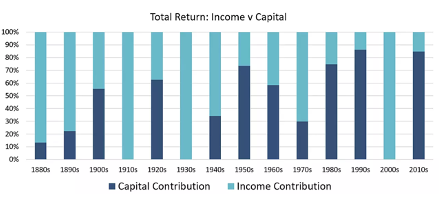Where will most returns likely come from going forward?
As history shows us, the period after an interest rate rising cycle can be quite difficult for equity prices as higher rates dampen economic activity while at the same time increasing financing costs. Given this, and the fact that equity markets are already starting from very high multiples, their outlook is probably skewed to the downside.
If we look at previous rate hiking cycles since World War II, on every occasion the US manufacturing index has entered a slowdown, and 12/13 times there has been an earnings recession.
Time will tell this time around, but against such a backdrop income as a source of return will likely be more important than ever going forward.
Historical Context
This isn’t a new phenomenon. If we look back at historical returns for the S&P 500, since 1880 there have been three 10-year periods where income comprised all of investors' returns, i.e. capital values were negative for a decade. This was the case in the 1910s, 1930s and as recently as the 2000s.
In fact, income is always a component of total return, whereas capital growth is not.

While the data is for the S&P500, the ASX is no different. Between 2007 and 2020, point to point, all of the returns generated by investors were from income. This was in a period that saw one of the largest resource booms, housing booms and low-interest rates.
Not all income is created equal
Typically speaking, the two most obvious sources of income returns for investors are dividends from equity investments and interest income from cash or bonds.
However, as we saw during COVID, dividends can be cut and the risk of this increases as profits start to unravel. Companies begin prioritising liquidity or having cash to seize bottom-of-the-cycle opportunities as we enter a recession with dividends being the first thing cut.
Another risk of relying too much on dividends is you run the risk of creating a portfolio comprised of companies in the same sector or region. Take Australian banks for example. High dividends, but there is little diversification benefit. In short, over-reliance on dividends can lead investors to unwittingly develop a bias towards certain sectors, such as banks, resources and retail particularly in Australia.
What about interest on cash or bonds? In recent months this has no doubt been a good place to store money and earn a decent return, but that isn’t always the case. In August 2008, the RBA cash rate was 7.25%. The following year the number had more than halved to 3.00%. This reflects the volatility of income and how easily and quickly it can be cut.
Again, the issue with interest rates is these tend to fall as the economy stalls with central banks cutting rates to stimulate economic growth.
In both instances when investors need income the most, the risk to dividends and interest income rises. So finding a source of income that diversifies risk, and does not result in markedly higher volatility, is not easy.
A solution – The income engine
Not easy but possible - and in our case achieved through the implementation process, receiving a minimum 15% contracted rate of return per annum as a result of our commitment to buying a share we want to own. This flows through in the form of an income stream that is not dependent on a company’s ability or management’s desire to pay a dividend to shareholders.
The other unique feature of such a strategy, unlike dividends and interest, is that it is priced off volatility. The higher the uncertainty about the future, the higher the premiums we collect to compensate for that higher uncertainty.
In the current economic environment, with historically high starting valuations for equities, high inflation and the lagged impacts of monetary policy starting to take effect, having a consistent and diversified source of income return can be invaluable.
5 topics

